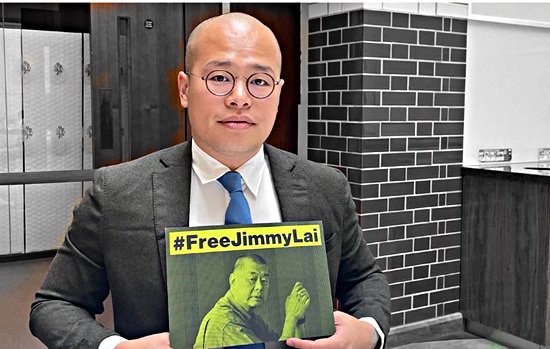
Jimmy Lai’s son Sebastien Lai is not optimistic about the jury-free trial of his father, the former publisher of Apple Daily, that is now underway.
The proceedings are expected to last maybe 80 days. Reuters reports (December 15, 2023):
“There’s actually no anxiety involved once you think about it, because it’s a complete show trial. The result is already predetermined,” said Lai, who lives in Taiwan.
Hong Kong’s government did not immediately respond to a request for comment. Hong Kong and Chinese authorities say the city’s rule of law is robust and all are treated equally before it. Both Hong Kong and Chinese officials say the security legislation was needed to restore stability to the former British colony.
Sebastien Lai said it was his understanding his father was “doing OK”.
“He’s 76 years old and has been in solitary confinement for the last three years, so I can’t imagine what that does to a person physically and mentally.”
Sebastien (shown above) has a harder time answering another question: “I always go back and forth. Would I rather my father was with me instead of standing up for the freedom of others? And my conclusion is I’m tremendously inspired by him and I’m very proud he’s my dad.”
Although the charges Jimmy Lai has faced are various, they come down to having had the temerity to defend the freedom of Hong Kongers through Apple Daily, the pro-democracy newspaper that he published for many years in Hong Kong until the Chinese government killed it in 2021. The raid and shutdown of the paper was part of a sweeping repression of Hong Kong liberties, including freedom of speech.
Sebastien has been lobbying the British government for many months to protest the incarceration of his father and do what it can to obtain his release. Finally, as the trial of his father loomed, David Cameron, former British prime minister and current foreign secretary, issued a formal statement:
Hong Kong’s National Security Law is a clear breach of the Sino-British Joint Declaration. Its continued existence and use is a demonstration of China breaking its international commitments.
It has damaged Hong Kong, with rights and freedoms significantly eroded. Arrests under the law have silenced opposition voices.
I am gravely concerned that anyone is facing prosecution under the National Security Law, and particularly concerned at the politically motivated prosecution of British national Jimmy Lai.
As a prominent and outspoken journalist and publisher, Jimmy Lai has been targeted in a clear attempt to stop the peaceful exercise of his rights to freedom of expression and association.
I urge the Chinese authorities to repeal the National Security Law and end the prosecution of all individuals charged under it.
I call on the Hong Kong authorities to end their prosecution and release Jimmy Lai.
Matthew Miller, a spokesman for the U.S. State Department, also issued a statement:
The United States condemns the prosecution of pro-democracy advocate and media owner Jimmy Lai in Hong Kong under the PRC-imposed National Security Law. Lai has been held in pre-trial detention for more than 1,000 days, and Hong Kong and Beijing authorities have denied him his choice of legal representation.
We urge Beijing and Hong Kong authorities to respect press freedom in Hong Kong. Actions that stifle press freedom and restrict the free flow of information—as well as Beijing and local authorities’ changes to Hong Kong’s electoral system that reduce direct voting and preclude independent and pro-democracy party candidates from participating—have undermined Hong Kong’s democratic institutions and harmed Hong Kong’s reputation as an international business and financial hub.
We call on Hong Kong authorities to immediately release Jimmy Lai and all others imprisoned for defending their rights.
Now let’s hear from the U.S. president and the current British prime minister.
Such statements matter. One of the proofs is that the Chinese government feels constrained to respond, trotting out its usual threadbare complaint about “foreign interference.”
The government of China commits many crimes against many people that major government officials and other public figures around the world should at least object to. They sometimes do object, though not often enough or always clearly enough. Such objections make life harder for China’s policymakers and diplomats, who understand the importance of ideas in propping up their rule and rationalizing their domestic and international conduct.
Meanwhile, many others who should also be resisting the predations of the Chinese Communist Party give it a free pass, actively sanction and cooperate with it, and even give standing ovations to Dictator Xi Jinping.





